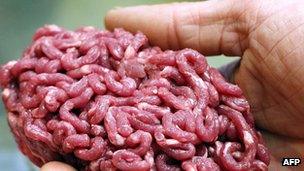Horsemeat scandal: Watchdog warns over food 'confusion'
- Published

The Food Safety Agency and two government departments share food policy responsibilities
The response to the horsemeat scandal illustrated the "confusion" surrounding food policy in the UK government, the National Audit Office has claimed.
A 2010 re-organisation had blurred the division of responsibilities between the Department for Environment, Food and Rural Affairs and the Food Standards Agency, it said.
And local authorities had been unsure who had been taking the lead.
Officials said intelligence sharing and food monitoring were being improved.
Leading British supermarkets recalled processed beef products found to contain horsemeat after the first cases of adulteration came to light in January following an investigation by Ireland's Food Safety Authority.
Others took frozen goods off their shelves as a precaution.
'Botched'
Since then, tests on 24,480 samples by British food retailers and processors found horsemeat in 47 products, while testing by local authorities of 514 products labelled as containing beef as a major ingredient revealed two containing horse DNA and four with traces of pig DNA.
So far three people have been arrested in the UK under the Fraud Act although no-one one has yet been prosecuted.
In a report examining the response to the scandal in England, the public spending watchdog found the public's expectations about the authenticity of food were not being matched by the effectiveness of controls in place.
Its main findings were:
The transfer of responsibility for some food labelling and monitoring from the Food Standards Agency to the Department for the Environment and the Department of Health in 2010 brought "no obvious benefit"
Local authorities in charge of enforcement were unclear who to contact first during the crisis
Intelligence sharing is weak and fragmented with information spread across 12 separate databases
No testing for horsemeat had taken place since 2003 and public food test samples had fallen by a quarter
Access to information from private testing needs to be improved
The UK needs to increase its understanding of food supply chains
While the Food Safety Agency (FSA) is responsible for food safety issues, the Department for Environment, Food and Rural Affairs takes the lead on food authenticity and composition while the Department of Health is in charge of nutritional labelling issues.
The National Audit Office's (NAO) criticisms echo those of the Commons Environment Committee, which said in July there had been a "lack of clarity" within Whitehall over where responsibility lay for dealing with such issues.
"The division of responsibility for food safety and food authenticity has created confusion," Amyas Morse, the watchdog's head, said.
"The government needs to remove this confusion and improve its understanding of potential food fraud."
Consumer confidence
Labour said there was a case for food safety and food fraud issues to be brought back under one roof.
"The chaotic structure put in place after the election should be urgently reviewed," Maria Eagle, the shadow environment secretary, said.
"It is clear from this report that David Cameron's botched departmental re-organisation created confusion about who was responsible for ensuring that meat was not wrongly being passed off as beef.
"Added to this confusion was the complete failure of ministers to take seriously the possibility that horsemeat was entering the food chain despite clear indications of an increased risk that this was taking place."
The Department for the Environment, Food and Rural Affairs (Defra) said the watchdog was satisfied that controls in place to guarantee food safety were effective but that the government "wanted to prevent food fraud as well".
"Defra and the FSA have already identified and begun work on the issues raised by the NAO," a spokeswoman said.
"We are improving intelligence-sharing and identifying parts of the food chain which need the closest monitoring.
"Food authenticity testing is making sure that consumers can be confident in the foods they purchase.
"However, it is important to work more closely with industry and local authorities so that resources can be targeted where they will be most effective."